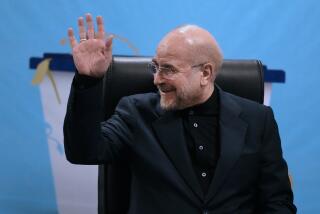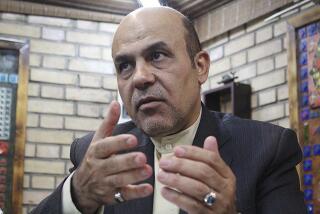Chalabi Denies Iran Spy Link
- Share via
WASHINGTON — Three days after his home and office were raided in Baghdad, Ahmad Chalabi -- the Iraqi politician who until recently was a U.S. favorite to play a significant role in a new government -- took to America’s airwaves Sunday to angrily deny allegations that he helped a close aide pass highly classified information about U.S. military operations and political plans in Iraq to Iranian intelligence.
Appearing on four political talk shows, Chalabi blamed the CIA for falsely accusing him of spying and challenged CIA Director George J. Tenet to meet him under oath at a congressional hearing to “resolve this issue.”
“These are allegations that are put forward and directed by the CIA,” he said on NBC’s “Meet the Press.”
Chalabi, a member of the Iraqi Governing Council, said he had last met with Iranian officials six weeks ago. He argued that he had “passed no secret information, no classified documents” to Tehran because he would “do nothing to harm the United States.”
A U.S. intelligence official, speaking later on condition of anonymity, said Chalabi’s charges “that George Tenet or the CIA made all this up regarding Iran ... are quite absurd. The facts are clear.” The official said the CIA would “welcome hearing him testify under oath” before Congress.
A Foreign Ministry spokesman, Hamid Reza Asefi, told reporters in Tehran that Iran had a “continuous and permanent dialogue with Chalabi” and other council members, according to Associated Press. “But spying charges are unfounded and baseless,” Asefi said.
The spying scandal came to light after Iraqi police, backed by U.S. soldiers, raided Chalabi’s home and the offices of his political organization, the Iraqi National Congress, on Thursday. Iraqi officials said later that they were seeking to deliver arrest warrants for eight of Chalabi’s aides, including a senior advisor who U.S. officials say was a paid agent for Iran’s Ministry of Intelligence and Security.
In his TV appearances Sunday, Chalabi was evasive when asked if he would cooperate with an FBI investigation seeking to determine whether U.S. officials illegally shared classified information with him or INC members.
“I will cooperate with any investigation conducted in the United States -- not here, where we have Abu Ghraib prison,” Chalabi told ABC’s “This Week,” referring to the site where U.S. forces are accused of abusing Iraqi inmates.
Chalabi’s relations with Washington have soured since he broke with the Bush administration and began to sharply criticize plans to transfer limited sovereignty to a still-unidentified Iraqi government on June 30. Chalabi and other members of the Governing Council fear that the plan being formulated by the U.S. and the United Nations will relegate them to the sidelines.
Chalabi insisted Sunday that the plan would spark new conflict in Iraq and scorned it as a ruse to leave the CIA and other intelligence agencies secretly in control.
“I refuse to have Iraq become a state of terror run by covert action agencies under diplomatic cover,” he said.
Chalabi called “baseless” mounting allegations that he and his aides deliberately misled the CIA and other Western intelligence agencies about Saddam Hussein’s illicit weapons programs to convince Washington to go to war.
He said his political organization had “introduced” U.S. government agencies to only three defectors with information about weapons of mass destruction. U.S. intelligence officials have said the INC steered numerous defectors to America and Europe with inaccurate or misleading claims about Baghdad’s purported chemical, biological and nuclear weapons.
Chalabi defended his prewar claims that U.S. troops would be greeted with joy in Iraq. “The liberation was successful,” he said. “The occupation has been a failure.”
The longtime exile, who left Iraq in 1958 and has been convicted in absentia of embezzlement charges in Jordan, was until recently so close to the White House that he sat behind Laura Bush when President Bush delivered the State of the Union address to Congress in January. He warmly greeted Bush when the president flew to Baghdad for Thanksgiving. He met with Bush “about four times,” he told CNN’s “Late Edition,” at least once in the Oval Office.
On “Fox News Sunday,” Chalabi said he had met Defense Secretary Donald H. Rumsfeld “less than four times” and Vice President Cheney “I believe twice.” Few defended Chalabi. Sen. Dianne Feinstein (D-Calif.), a member of the Senate Select Committee on Intelligence, was particularly harsh.
“I think he’s a charlatan,” she told CNN. “I think he’s a manipulator. I don’t think he’s a man that you can trust.”
More to Read
Sign up for Essential California
The most important California stories and recommendations in your inbox every morning.
You may occasionally receive promotional content from the Los Angeles Times.














